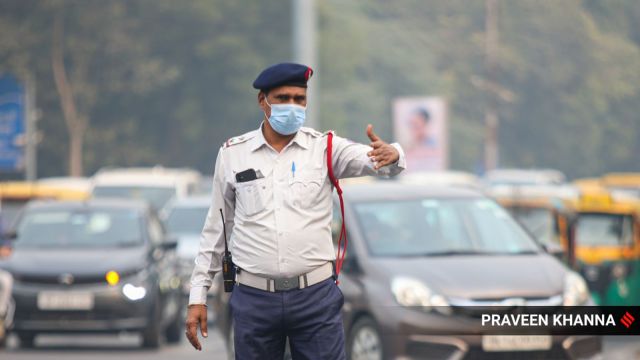‘Have to breathe this air all day, can’t abandon our duty’: Delhi’s frontline workers bear the brunt of toxic pollution
Day after day, Delhi’s frontline workers and the working class -- traffic police officers to auto-rickshaw drivers -- continue to brave the toxic haze, risking their health for their livelihoods
 Frontline workers and working class toil amid the toxic haze (Express Photo by Praveen Khanna)
Frontline workers and working class toil amid the toxic haze (Express Photo by Praveen Khanna)At the ITO crossing on Tuesday, a group of traffic police officers sat in a room on the side of the road. The air was no better today, with the AQI staying steady over the 450-mark. To avoid staying out for too long, they work in rotations and rest in this room.
“But we can’t abandon our duty,” one of the officers emphasised.
“We have been provided masks, water jugs and a room to rest in, but our duty hours remain the same.”
Pollution, they said, is a yearly phenomenon. “And every year we get burning eyes and headaches… we keep drinking warm water and tea with jaggery throughout the day to soothe our throats,” the officer said.
Day after day, Delhi’s frontline workers and the working class — traffic police officers to auto-rickshaw drivers — continue to brave the toxic haze, risking their health for their livelihoods. Many suffer from respiratory ailments, burning eyes, and other health issues, yet continue to toil, often without adequate protection. The Indian Express spoke to a few of them.
 Ajit, who sells tea (Express Photo)
Ajit, who sells tea (Express Photo)
At a traffic post in ITO, Akash Kumar (31), a CRPF soldier hailing from Telangana, stood watching the traffic pass. “We get masks from the government and the guidelines tell us to take rest often and not stay out for too long. But we have to stay out for our duty most of the time,” he said.
“The air is much better in Hyderabad. I didn’t want to bring my children and wife here because of the air… I’ve read on the news of babies and senior citizens falling sick. I’ve never seen such thick smog anywhere else,” he added.
His colleague, Rajesh Kumar, agreed: “In the first few days I thought my eyes were burning because I was tired after doing night duty… I’m not feeling any other effects but I know they’ll show when we’re older.”
On the other side of the road, Meenu (51) was busy selling dal-chawal and chole-kulche from his roadside stall, which he’s been manning for the last 30 years. “The air wasn’t so bad before; it’s only gotten worse in the last four to five years… I’ve started wearing a mask only recently. If I don’t wear one, I start coughing and my throat burns,” he said.
In Anand Vihar, where the AQI has been among the highest in Delhi, Dilip Choudhary (43) continues his work unfazed by the dropping air quality. “I have to be here by 6 am and I leave sometime around 9 pm. I make maybe 15 to 20 trips to the railway station each day,” said the porter, waiting for customers at the ISBT. “It gets really hard to breathe during this time of the year, especially when I have to carry heavy bags… but I haven’t studied much and I have to find a way to send my kids to school and support my family,” he said, adding, “I make sure to have a cup of kadha with gud and ajwain every night before going to sleep.”
At the bus stand’s entryway, Harinder Singh (39) scans people’s luggage.
“There are no safety provisions for us,” the security personnel complained. “The worst AQI is here and we have to stand in the open all day and breathe in this dusty air… lekin pet ka sawaal hai. Every year, all of us complain of coughing and burning eyes… my chest feels so heavy on some days that I feel like I can’t breathe,” Singh said.
Asked why he doesn’t wear a mask, he said, “We’re told not to wear our masks, that people need to see our faces when we scan their bags”. “They feel suspicious of us too, you know. We look like dacoits covering our faces and looking through their bags!” he laughed.
“It’s not just our bosses; people who work with us themselves say we’re being dramatic when we wrap handkerchiefs around our face,” said Geeta (50), who works as a security guard as well.
“Oh, it’s all rubbish,” her colleague Ravi Yadav interrupted. “Sardi ka mausam hai, kohra hi hai yeh (It’s winter, this is nothing more than fog). Nothing will happen to us,” he said dismissively.
Ashok Yadav (32), an auto driver waiting for riders, joined in: “It happens every year, and every year there’s a huge fuss about it. I wear a mask some days but my eyes burn and my head aches a lot… wearing a mask doesn’t help with that.”







